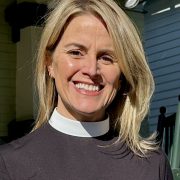“Care for Every Body: Gender-Affirming Healthcare and the Woman Who Touched Jesus’ Cloak” Mark 5:24-34, #Markseries, #attheTable

By Catherine Montgomery
At The Lighthouse, a safe space for LGBTQIA+ youth and their parents, I have had the privilege of knowing trans minors and adults for whom gender-affirming healthcare has been critically important to their wellness. I have seen these friends work exhaustively to access therapies that help them thrive. In the U.S., severe restrictions on these therapies have often been framed theologically as a violation of the divinely ordained gender binary and thus a source of harm rather than healing. These arguments fall into the ableist trap of discriminating against bodies and minds that fall outside the “normative” parameters defined by the majority and judging them, therefore, inadequate agents of their own care.
An alternative Christian viewpoint might be explored through the lens of Jesus’ healing of the woman who hemorrhaged for twelve years (Mark 5:24-34). She had been a woman of financial means but spent all she had on many physicians who were unable to help her. She was isolated by her illness, which made her ritually “unclean,” and marginalized by her gender and poverty. As Jesus walked by, the woman bravely reached out to touch him, and his healing power flowed to her through his garment. Jesus was “immediately aware that power had gone forth from him,” turned about in the crowd, and said, “Who touched my clothes?” (v. 30).
Not only was Jesus not made ritually impure by her touch, but her suffering was also ended by the flow of his power. His grace, not her condition, was contagious. His care for her body poured forth unimpeded by judgment or stigma, bringing new life to one who relentlessly pursued her own healing.
Candida Moss notes that scholars have often focused on Jesus’ lack of awareness as he felt power leave him, as opposed to what happened within his body. She draws a parallel between the woman and Jesus, in that they are both “porous and leak uncontrollably.” Because Jesus’ body was an abundant and uncontrolled source of divine power for the hemorrhaging woman and others, Moss says, he was an “alternative health care system,” free and accessible.
The hemorrhaging woman of Mark’s gospel has something to say to us as we consider the current threats against gender-affirming healthcare. Transgender people, who make up less than 1% of the general population, are at increased risk of depression, anxiety, and suicide. Despite the support of major medical associations for medically necessary, age-appropriate, and safety-tested therapies, government intervention has significantly impacted both the availability and affordability of these treatments, not just for minors but for adults as well.
The bleeding woman of scripture convicts our nation’s ableist relegation of some citizens as unworthy agents of care for their own bodies. Because she had to approach Jesus from behind, not able to address him directly, she reveals our obliviousness to those in our midst whose bodily experience falls outside of the privileged “norm.” Because she had faith to pursue her own healing, she shows us the strength and persistence of all who fight for their bodily care, though their fight should not be required. And the Markan Jesus shows us that God cares for the suffering outsider so unconditionally that divine power flowed uncontrollably to the one in need, with no assessment of propriety. So worthy was her healing that no other action could stop it, not even the human will of the one who was both fully divine and fully human. Mark wrote to a traumatized community, wondering how followers of Jesus should live in a world where the reigning power was opposed to the power they saw in him, the savior of the oppressed. The hemorrhaging woman shows us how power must be interrupted in the assurance that there is enough grace for everybody—for those who can access the system directly and for those who are forced to come up from the back. Because trans bodies, like all bodies, are evidence of God’s wonderfully intricate and diverse creation, bodily care that contributes to their abundant living must not be withheld.
Catherine Montgomery is an Episcopal priest serving St. Mary’s Episcopal Church and Outreach Mission in Jacksonville, Florida, and the founder and executive director of The Lighthouse, which hosts safe spaces for LGBTQIA+ youth and their families in Episcopal churches and other affirming faith communities. She holds an MDiv from The General Theological Seminary.




